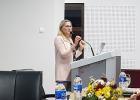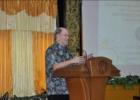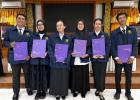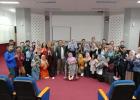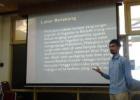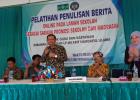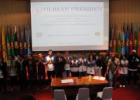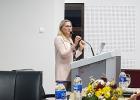You are here
Program Objectives and Program Learning Outcomes
Primary tabs
.
Program Objectives
Program Objectives were developed based on the vision and mission of degree program and national regulation including Act No.14/2005, Indonesia National Qualification Frameworks (INQF or KKNI) level 8, and the Regulation of the Ministry of Research and Higher Education Number 44/2015 about the National Standard of Higher Education. The government regulations which are relevant with curriculum development lay the foundation for setting the Program Objectives (PO). The PO also align with the program vision and mission. The development also involved stakeholders including government representatives, other higher education institutions, professional organization in the field of Applied Linguistics, and alumni, as follows:
|
PO.1. |
To yield experts who possess in-depth theoretical, methodological, and applied knowledge and skills in Applied Linguistics; |
|
PO.2. |
To develop applied works in the scope of linguistics, literature, and translation through inter-, multi-, and transdisciplinary research. |
|
PO.3. |
To produce ethical academic works in various formats and international forums. |
The designed program objectives are highly in line with the competence recommended by the national guideline for curriculum development (KKNI level 8):
The Relevance of the Program Objectives with the Competence Suggested by the National Guideline
|
Indonesia National Qualification Frameworks (KKNI, Level 8) |
Program Objectives (PO) |
||
|
1 |
2 |
3 |
|
|
able to develop innovative product science, technology, and/or art in specific field and professional practices by conducting research and producing innovative works |
√ |
|
|
|
able to solve problems in the field of science, technology, art in specific field through interdisciplinary and multidisciplinary approaches |
|
√ |
|
|
able to manage and conduct research and development which are applicable in society and recognized nationally and internationally |
|
√ |
√ |
Occupational Profiles of GraduatesThe program objectives have been informed to students, academic staff, employers, and stakeholders through various media, such as academic regulations handbook, focus group discussion with stakeholders through formal meetings and community service programs, regular academic meeting with staff, and the program website. To improve the program objectives, a tracer survey is regularly conducted to gather information about the graduates’ occupation in order to evaluate the program objectives. The complete results of the survey are available in criteria 2 of Quality Assurance in this self-evaluation report. Table 3 provides details about occupational profiles of the graduates which are obtained through the survey.
|
Occupational Profiles |
Description |
|
Linguists |
Researcher and consultant in the areas of language, linguistics in general, and applied linguistics |
|
Language educator |
Lecturer in Higher Education institutions or language teachers in formal and non-formal institutions |
|
Translator |
Professional translator and interpreter |
|
Professional writer |
Content creator, editor, and copy editor of fiction and non-fiction texts |
Program Learning Outcomes (PLO)
Based on the previously stated program objectives, a set of program learning outcomes were developed to describe the professional attitudes, knowledge and skills to be possessed by the students after completing the program.
Program Learning Outcomes (PLO):
- ATTITUDE:
PLO.1. Able to demonstrate religious and humane attitude in conducting academic, social, and professional tasks;
- KNOWLEDGE:
PLO.2. Able to apply Applied Linguistics theories, methods, and technology to great details;
PLO.3. Able to solve problems in the fields of Linguistics, literature, and translation either independently or collaboratively;
PLO.4. Able to inquire recent knowledge, ideas, and works in the fields of linguistics, literature, and translation through academic processes;
- SPECIFIC SKILLS
PLO.5. Able to apply relevant concepts, methods, and technology in the scope of Applied Linguistics;
PLO.6. Able to evaluate knowledge and skills in the fields of linguistics, literature, snd translation to exhibit new ideas;
PLO.7. Able to conduct systematic research using appropriate, effective, and ethical methods;
PLO.8. Able to disseminate research results in required formats at international-level.
- GENERAL SKILLS
PLO.9. Able to develop critical, creative, and innovative ideas;
PLO.10. Able to independently increase one’s own learning capacity through the use of various media;
PLO.11. Able to make good use of informational technology for the improvement of knowledge and the implementation of one’s expertise.
CONTACT US
FAKULTAS BAHASA, SENI, DAN BUDAYA
(FACULY OF LANGUAGES, ARTS, AND CULTURE)
UNIVERSITAS NEGERI YOGYAKARTA
Address: Jl. Colombo No.1, Karang Malang, Caturtunggal, Kec. Depok, Kabupaten Sleman, Daerah Istimewa Yogyakarta 55281
Phone: (0274) 550843
Website : lt.fbsb.uny.ac.id
Email: kaprodi.lt.s2.@uny.ac.id
Copyright © 2026,

